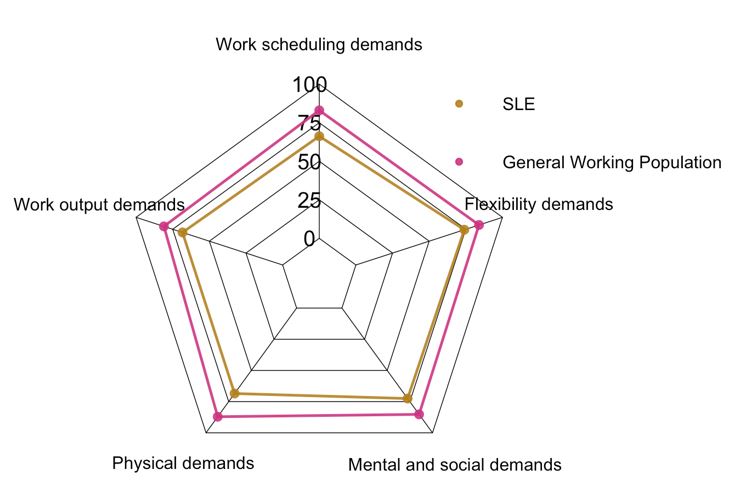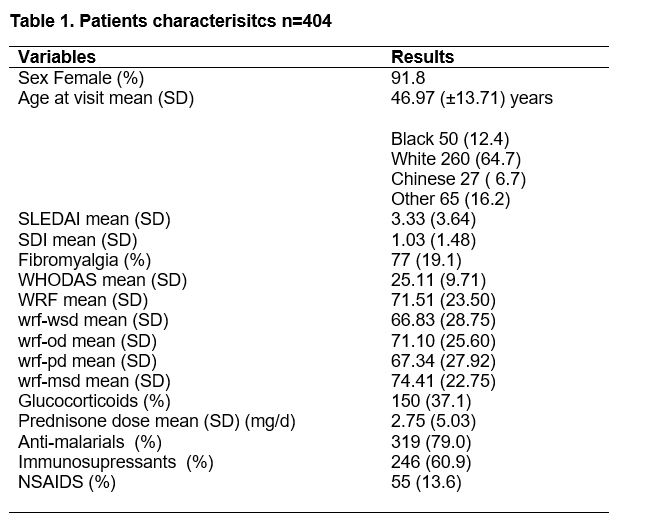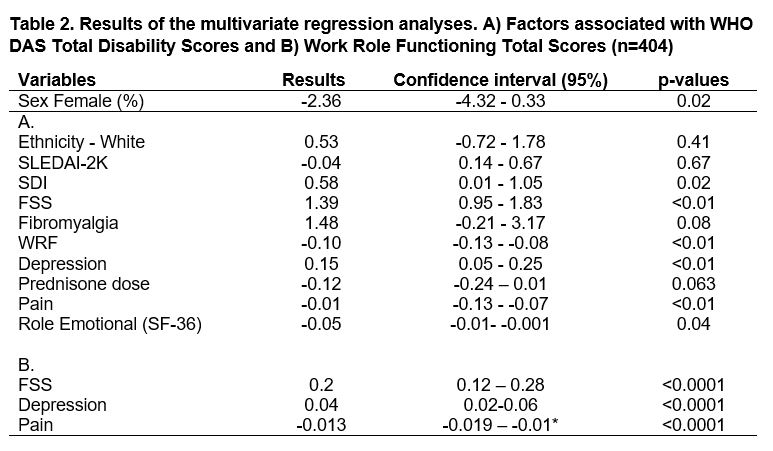Session Information
Session Type: Poster Session B
Session Time: 10:30AM-12:30PM
Background/Purpose: Systemic lupus erythematosus (SLE) has a significant and long-lasting impact on work outcomes, is a source of long-lasting work disability, and presents challenges with participation in activities of daily living. This study aimed to create a functional profile for patients with SLE. A functional profile is defined as activities of daily living and those related to work functioning (activities of daily living).
Methods: A cross-sectional investigation was carried out across six Canadian facilities, comprising six academic institutions and one community-based facility. Clinical measurements were obtained, including the SLEDAI-2K and ACR/SLICC Damage Index (SDI) and patients’ medications. Patients completed the Work Role Functioning Questionnaire v2.0 (WRFQ), the World Health Organization—Disability (WHO-DAS) Assessment Schedule 2.0 (WHO-DAS), and the Beck Depression Inventory (BDI-II). Descriptive and inferential statistics were computed for the demographic, clinical, and functional outcomes. Univariate and multivariate regression analyses to study the association with WHO-DAS and WRF were performed.
Results: 404 patients were studied; mean age was 47.0±13.71 years and 91.8%% were female ( 64.7% White, 12.4% Black, 6.7% Chinese and 16.2% other races) with a mean SLE duration of 15.7 ±11.8 years (Table 1). The total mean score for the WRFQ was 71.51.8±23.5. The WRFQ subscale mean scores were also reported for work scheduling demands (66.8±28.8), work output demands (71.1±25.6), physical demands (67.3±27.9), mental and social demands (74.4±22.8) and flexibility demands (75.0±24.7) (Figure 1) – comparison to the general working population). The WHO-DAS 2.0 total mean score was 25.1±9.71, representing approximately the 93.8th population percentile, meaning that only about 6.1% of the population scored higher (more disabled) than our sample. In the multivariate analysis, sex (Female), damage (SDI), prednisone dose, fatigue severity score, Work Role Functioning total scores, presence of fibromyalgia, Role Emotinal SF-36, depression and pain were associated with increased disability. Similarly, fatigue severity score, depression, and pain were associated with decreased WRF total scores (Table 2).
Conclusion: This Canadian study confirmed that patients with SLE suffers from high level of disability and functional decline and as measured by WHO-DAS and WRF. Several factors were associated with disability and functional decline including accrued damage, presence of fatigue and fibromyalgia, depression, pain and prednisone dose. Developing the initial functional profile of work disability will facilitate a multidisciplinary approach to enhance the care and management of work disabilities and related functional outcomes.
To cite this abstract in AMA style:
Nowrouzi-Kia B, Avina-Zubieta J, Fox M, Shaw W, Ho M, Li Q, Ivory C, Fortin P, Keeling S, Reynolds J, Haaland D, Pope J, Lim L, Katz P, Urowitz M, Whittall Garcia L, Gladman D, Touma Z. Work-Related Disability and Function in Systemic Lupus Erythematosus (SLE): Outcomes of an Exploratory Study from Different Canadian Centres [abstract]. Arthritis Rheumatol. 2024; 76 (suppl 9). https://acrabstracts.org/abstract/work-related-disability-and-function-in-systemic-lupus-erythematosus-sle-outcomes-of-an-exploratory-study-from-different-canadian-centres/. Accessed .« Back to ACR Convergence 2024
ACR Meeting Abstracts - https://acrabstracts.org/abstract/work-related-disability-and-function-in-systemic-lupus-erythematosus-sle-outcomes-of-an-exploratory-study-from-different-canadian-centres/



